For Afghans in India, including medical tourists from the war-torn country as well as migrants and refugees staying here much longer, the safety of friends and families is the biggest concern – particularly for those linked to the now collapsed government or who have had work ties with the US.
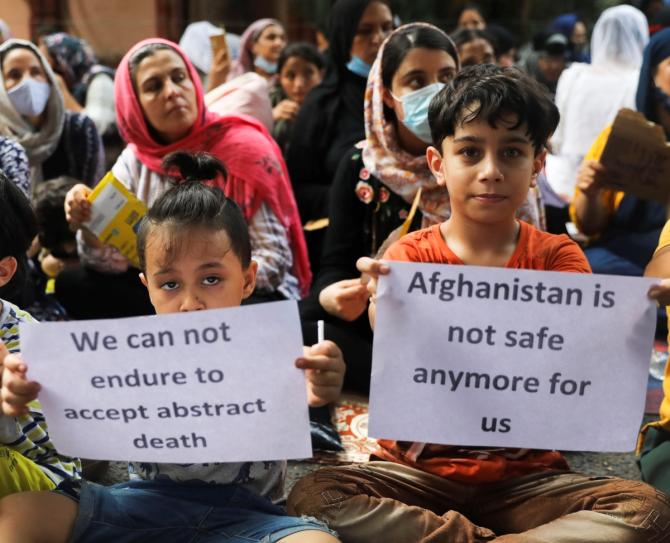
On August 15, Suliman Siddiqui boarded a Kam Air flight with his grandparents from Kabul to New Delhi.
By the time he landed, the Taliban had laid siege to the Afghanistan capital where life had been “normal” for the 21-year-old until hours ago.
It turned out to be the last commercial flight from Kabul to Delhi.
Suliman's grandfather, a heart patient, is being treated at a private hospital in Delhi, and they had booked a return ticket 25 days later.
“Since we arrived, visas and flights have been cancelled, the airport is shut, our president has escaped, and the Taliban have control over all of Kabul. I am stuck here,” Suliman says.
For Afghans in India, including medical tourists from the war-torn country as well as migrants and refugees staying here much longer, the safety of friends and families is the biggest concern – particularly for those linked to the now collapsed government or who have had work ties with the US.
For now, those in India can only reach their kin over phone calls and video chats.
Suliman is worried for the safety of his seven-member family, especially his father who used to work for the American embassy.
His Indian visa allows him to stay for three months, but he is eager to return home soon as a cloth shop that he runs is shut and he is also due to write second-year undergraduate exams in less than a month's time.
“My parents are at home. They don't go outside because if the Taliban see my father, they could harm him,” he says.
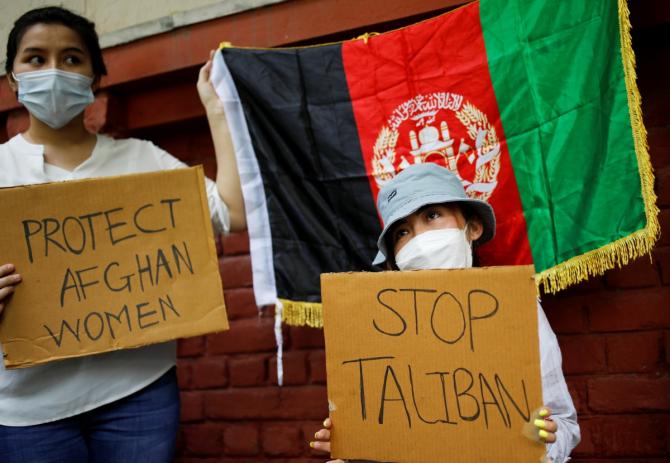
Other Afghans in Delhi echo this fear and are unwilling to accept overtures from the Taliban who are promising a softer rule than the first ironfisted regime during 1996-2001.
Samiullah (who identifies only his first name) has been living in Delhi for more than three years.
He has siblings in Kabul, including a brother who worked as a customs officer until a week ago.
“People have now left their jobs and are staying home. The Taliban enter homes, question people and take away private vehicles.”
Educated people, he says, face trouble and “it's best for them to leave Afghanistan”.
He has promised to apply for visas for his three siblings so that they can migrate to India or any other country.
Samiullah, 33, himself is an asylum-seeker who is yet to receive a refugee card from the United Nations High Commissioner for Refugees (UNHCR).
His family is from Logar in east Afghanistan, a province that was virtually under the Taliban even when he left the country with his parents.
He complains that some who arrived only weeks ago have got refugee status ahead of many asylum-seekers like him.
Samiullah works at a travel agency in Lajpat Nagar, a locality in Delhi that has been a haven for migrant Afghans for decades.
This South East Delhi neighbourhood, also referred to as “Little Kabul”, came into being when Afghan migrants flocked in during the Soviet-Afghan war in the 1980s.
Restaurants serving Afghan delicacies, food and bread shops, drugstores with Dari signage catering to medical tourists are a common sight here.
The current turmoil has also resulted in a fresh exodus. “A lot of the flats and guest houses here were empty until a week ago. If a guest was charged Rs 500-600 per day for a room, now it's gone up to Rs 1,200-1,500,” says Samiullah, who has also lived in Peshawar, Pakistan, and witnessed teenaged Afghan boys getting trained by the Taliban there.
Working women and the Shia minority had a compulsion to migrate even when the Taliban were not in power.
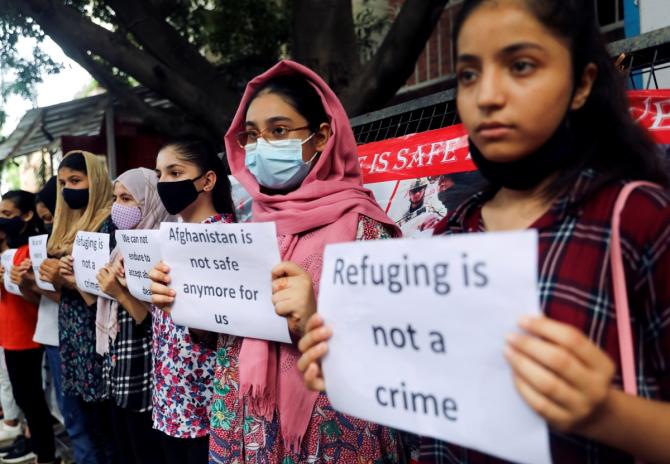
Yalda Madadi came to India seven years ago after sensing that the country wasn't going to be significantly more liveable while under US occupation.
“Bomb blasts were common and my mother felt we might die someday, but people could still work freely,” says the 27-year-old who was working at a German development agency after graduating with BBA in Kabul. She now works with Samiullah in Lajpat Nagar.
Two sisters, one of whom is a dry fruit-seller in Lajpat Nagar, come from a family that's mostly lived away from its native place in Bamiyan for over four decades.
The elder sister was born in Badaun, Uttar Pradesh, where her father taught in a madrasa.
She also lived and got married in Iran and stayed briefly in Afghanistan before returning to India 14 years ago.
“We are Shias, viewed as kafirs (non-Muslim) by the Taliban. Twenty years ago, they burnt down a house in Bamiyan, killing 20 relatives. Six months later, the US occupied Afghanistan,” the elder sister says.
She feels the Taliban's recent assurances for women are false.
“We have seen how they ruled two decades ago. They took away many people to turn them into jihadis,” she says, adding that many people in Afghanistan are desperately seeking emergency visas for an escape.
Among them is her husband, who supplies the dry fruits to her, her parents and other relatives.

Meanwhile, as they worry about their kin back home, Afghan students in India are also seeking help for a secure future for themselves.
Jalaluddin, a 25-year-old postgraduate student of development and labour studies at Jawaharlal Nehru University (JNU), hopes the administration would waive off fees for Afghan students on humanitarian grounds.
“They need to provide admission in absentia because we cannot go back to Afghanistan. This will make the admission process easier than the entrance exam route,” he suggests.
His friend Mohammed Shafiq Sultan, 30, who holds an MA degree from JNU, adds, “If we get a scholarship, we will not face problems over visa and hostel accommodation. And we can earn a living.”
Jalaluddin's family is seeking asylum but because of the chaos around the airport, they have been unable to fly out of Kabul.
“They are trying to get out because they don't want to lead a life of slavery,” he says.
Sultan, who comes from a rural region in Wardak province, has struggled to contact his family in the last few days.
Having been in India for five years, Jalauddin rules out going back even if there is a semblance of normalcy because “life will be under threat”.
Sultan, who worked as an executive officer in the Afghanistan customs department, however, wants to return if there is a “United Nations-backed, India-like” government that believes in fraternity.
For them, India has been like a second home.
“India stands for unity and diversity and human rights. India and Afghanistan have had deep cultural relations from the time of Gautama Buddha,” says Sultan.
Feature Presentation: Rajesh Alva/Rediff.com



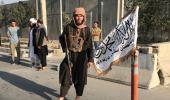





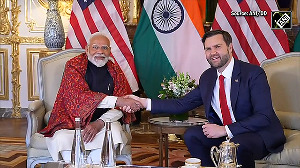
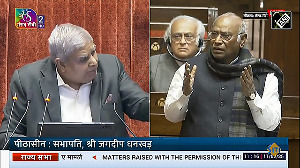

 © 2025
© 2025